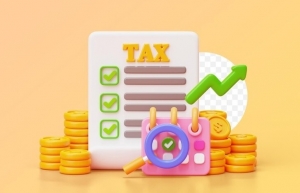Proposed VAT rule pros and cons for digital products
 |
| Nguyen Minh Da Partner of Advisory Services Forvis Mazars in Vietnam (left) and Nguyen Tan Tai Manager of Advisory services Forvis Mazars in Vietnam |
In addition to a number of proposals to minimise tax administrative procedures, expand the scope and subjects of tax refund, the draft VAT law has brought many mixed opinions in public opinion.
Under the current VAT law, digital products provided on digital platforms are subject to 10 per cent VAT if the revenue is generated from consumption within Vietnam. However, revenue from consumption abroad is treated as export services and subject to zero VAT. Determining whether digital products are consumed domestically or internationally at the time of service provision is complex and relies heavily on self-assessment and declaration by taxpayers with varying degrees of supporting documentation.
In the amended draft law, it was proposed to not apply the zero VAT rate to digital products provided on digital platforms. According to Decree No.71/2007/ND-CP, these include software products (system software, application software, and utility software) and digital content products (e-books, digital documents, online games, digital music, and digital advertising). As per the draft, these digital products and services, even if consumed abroad, will not be considered export services.
The Ministry of Public Security reported that by the end of 2023, Vietnam’s digital economy accounted for over 17 per cent of GDP, potentially reaching 20 per cent by 2025. However, the current legal framework for digital assets, products, and services is not fully developed. Therefore, Vietnam’s legal framework must adapt to the rapid growth of the digital economy.
The proposal to not apply zero VAT to digital products has sparked controversy. It is believed that a comprehensive legal framework for digital products and services, especially exports, is necessary to ensure fair competition between the digital economy and other economic sectors.
Currently, export services are defined as those consumed outside Vietnam, excluding services provided to foreign customers as stipulated by the government.
In recent years, verifying the consumption of services abroad poses significant challenges during tax audits due to the intangible nature of services, which are not recorded on customs declarations like exported goods.
In practice, many businesses self-identify their services as export services consumed outside Vietnam and issue invoices with a zero VAT rate. However, during audits, tax authorities often reclassify these services as domestically consumed and retroactively impose a 10 per cent VAT due to insufficient documentation proving foreign consumption, leading to financial difficulties for service providers.
To address these challenges, the amended draft law restricts export services to include only transportation rental services used outside Vietnam; aviation and maritime services directly supplying international transportation or through agents; and all other export services would be subject to a 10 per cent VAT rate. With this content, all other export services are subject to VAT at the rate of 10 per cent.
VAT inherently has a territorial principle, taxing consumption of goods and services within the national territory and not taxing consumption outside the territory. This ensures fairness in international transactions by exempting exported goods and services from VAT and taxing imported goods and services.
The proposed limitations on export services contradict international practices and global trends. In 2023, Vietnam’s export service revenue reached approximately $20 billion, with an average annual growth rate of 11 per cent higher than GDP growth. The proposal does not align with Vietnam’s economic growth trajectory and could negatively impact the competitiveness of Vietnamese businesses by increasing costs and reducing the competitiveness of export services compared to other countries.
We believe that the drafting committee should consider additional mechanisms, conditions, or resources to identify and verify export services during audits instead of restricting the types of export services as proposed in the current draft.
Additionally, several points should be considered. Firstly, it should maintain the application of the zero VAT rate for services provided by domestic enterprises to export processing enterprises.
It must also clarify the scope of application or maintain the current regulations for export services applying the zero VAT rate, while supplementing mechanisms, conditions, or resources to identify and verify export consumption during tax audits, instead of limiting the types of export services as proposed in this draft.
Specific standards should be introduced for software and digital information products in line with specialised industry regulations. The committee could consider coordinating with other ministries and relevant authorities to cross-check and verify information and data declared and inspected by digital service and product exporters through digital platforms.
Particularly for software production services that meet current regulations, the zero VAT rate should be applied, as this is a high-tech sector supported by national development projects.
 | Appying VAT on fertiliser for sustainable development Applying VAT at 5 per cent on fertiliser will benefit various parties and contribute to the sustainable development of the industry. |
 | Businesses anticipate green light for fertiliser VAT switch Domestic fertiliser producers will have opportunities to capture market share if the proposal to apply a new VAT rate on fertiliser is approved. |
 | State budget balance needed following VAT decision Businesses in Vietnam will continue to enjoy an 8 per cent VAT rate until the year’s end following an extension to the rate cut, which will cause a decrease in state budget revenues. |
 | Lawmakers study VAT implications Some have argued that the National Assembly should increase the existing common VAT rate to swell the state budget, but many enterprises are suffering from lingering difficulties |
What the stars mean:
★ Poor ★ ★ Promising ★★★ Good ★★★★ Very good ★★★★★ Exceptional
Related Contents
Latest News
More News
- IP alterations shape asset strategies for local investors (January 22, 2026 | 10:00)
- 14th National Party Congress: Vietnam - positive factor for peace, sustainable development (January 22, 2026 | 09:46)
- Japanese legislator confident in CPV's role in advancing Vietnam’s growth (January 22, 2026 | 09:30)
- 14th National Party Congress: France-based scholar singles out institutional reform as key breakthrough (January 21, 2026 | 09:59)
- 14th National Party Congress: Promoting OV's role in driving sustainable development (January 20, 2026 | 09:31)
- 14th National Party Congress affirms Party’s leadership role, Vietnam’s right to self-determined development (January 20, 2026 | 09:27)
- Direction ahead for low-carbon development finance in Vietnam (January 14, 2026 | 09:58)
- Vietnam opens arms wide to talent with high-tech nous (December 23, 2025 | 09:00)
- Why global standards matter in digital world (December 18, 2025 | 15:42)
- Opportunities reshaped by disciplined capital aspects (December 08, 2025 | 10:05)

 Tag:
Tag:




















 Mobile Version
Mobile Version